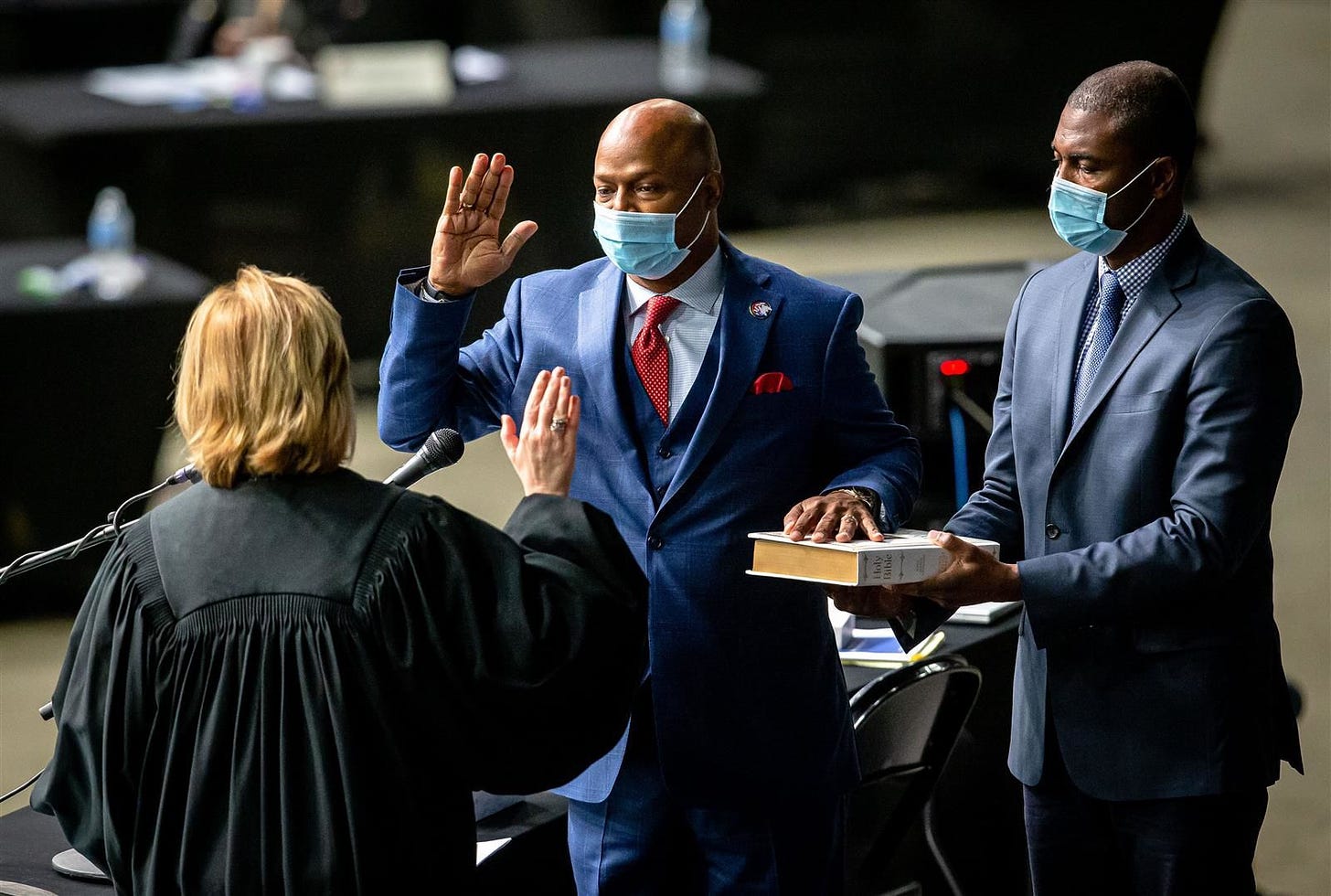THE ILLINOIZE: Thursday Free for All
January 13, 2022
Good morning and happy Thursday.
The legislature has canceled in person activity again next week. With each passing week it makes it more difficult to imagine the General Assembly meeting the planned April 8 adjournment date.
I hope you’ll take a moment today to become one of our paid subscribers.
Paid subscribers get two exclusive newsletters each week, breaking news alerts (including one we’re hoping to have today), previews of interviews, and more.
We’re knocking $22 off the price to kick off 2022, so you can get a year subscription for just $53. That’s less than a lobbyists lunch. (Zing.)
Click below and join us today. We’re funded with your support, and we can’t do it without growing our community.
As always, drop me a note at patrick@theillinoize.com with your questions, comments, criticisms and compliments. (Only compliments will be read.)
Let’s get to it.
YOUR THURSDAY FREE FOR ALL
(note: we’re not responsible for paywalls and restrictions from other news outlets)
Illinois’ top doctor says it’s too soon to tell if omicron surge has peaked as COVID-19 deaths reach highest level in nearly a year (Chicago Tribune)
Illinois is still setting records for new COVID-19 cases and hospitalizations, and with coronavirus-related deaths reaching levels not seen in nearly a year, the state’s top public health official said Wednesday it’s too soon to say whether the latest omicron-driven surge has peaked.
Despite a small dip in the number of COVID-19 patients in hospitals statewide as of Tuesday night compared with the previous day, the seven-day average increased to 7,173 patients per day, the highest level at any time during the pandemic.
“You really want to see a consistent decline,” Dr. Ngozi Ezike, director of the Illinois Department of Public Health, said during a news conference at the James R. Thompson Center in the Loop. “I will be the first to announce it when we can say that pretty confidently — cross my fingers and toes, but I just don’t want to get ahead of ourselves.”
With COVID-19 hospitalizations at record levels and only about 9% of staffed intensive care beds available statewide, Ezike painted a dire picture of the challenges facing hospitals and those who need urgent medical treatment.
“We’re making it difficult for people who are having a heart attack, who end up in a car crash, have their appendix burst, have a cancer-related complication — any kind of medical emergency — we’re threatening the ability of those people to get the care they need,” she said.
Related: State shortens minimum COVID-19 quarantine at schools to five days (Daily Herald)
As school absences mount, so does frustration (Champaign News-Gazette)
What should I do if I need treatment for something other than COVID during Illinois surge? (Belleville News-Democrat)
As Republicans push crime as top election issue, House Speaker defends Democratic efforts at reform but hints at new anti-crime package (Chicago Tribune)
With Republicans hammering the statewide spike in crime as their top election year issue, Democratic state legislators are being forced to defend last year’s sweeping criminal justice legislation and have opened the door to adding crime-fighting proposals to the agenda of this year’s condensed session in Springfield.
Illinois House Speaker Emanuel “Chris” Welch was vague about what measures could be under consideration, but acknowledged a need to address increases in crimes like carjackings and organized retail theft.
“I can’t talk to you about specifics 11 days into session. But I can tell you that conversations are already taking place on, you know, a possible crime package, anti-crime package,” the Hillside Democrat said in a telephone interview this week to mark his first year as the General Assembly’s first Black House speaker.
“It’s being done with all stakeholders involved. And we’re just getting started. But that’s certainly something that’s high on our priority list,” Welch said.
Welch said he remained a supporter of cash bail elimination and cautioned against tying a measure that hasn’t yet taken effect to the rise in violence.
“The violence that’s going on in the country, going on in the state, violence is going on everywhere. It’s an issue. It has nothing to do with a piece of reform that hasn’t even gone into effect yet,” he said.
Welch reflects on first year as House speaker (Capitol News Illinois)
One year after being named speaker of the Illinois House, Rep. Emanuel “Chris” Welch says he is proud of the accomplishments he and his colleagues achieved and he looks forward to building on that record.
“I actually thought 2021 was one heck of a year,” the Hillside Democrat said during a recent interview. “You know, we passed the historic, nation-leading Climate and Equitable Jobs Act, the CEJA bill. We protected and expanded voting rights. We made Illinois the beacon of hope for protecting reproductive rights and a refuge for women all around the country. The work that we did on the budget and restoring fiscal stability and credit upgrades, paying off a $2 billion loan and saving $82 million. Where do I end? We had a really great year, and certainly looking forward to building on that.”
On Jan. 13, 2021, Welch was elected speaker of the House, succeeding the long-serving but embattled Michael Madigan and becoming the first Black person to be the House leader.
“It's a very time intensive job,” he said when asked what he’d learned in his first year. “And literally, you're working seven days a week no-stop. …A lot of work involved. It takes cooperation from your friends from your family, from your employers.”
During his first year, Welch worked to put his own imprint on the speaker’s office, setting a much different tone than Madigan, who seldom gave media interviews and shunned the use of email or social media.
“I certainly think that it's a new day in Springfield,” he said. “I think Democrats up and down our ranks would agree with that. I think if you get past Republican leadership, the rank-and-file Republicans would agree that it's a new day.”
“The office of the speaker has been open more than it ever has, I believe in the last 36 to 40 years,” he continued. “Many of my colleagues on the other side of the aisle came into the office of speaker and said they had never been in there before. They came in to meet with me about ideas they were proposing last year in the Legislature, ideas that got out of Rules (Committee), got out of the House, got out of the Senate, and hit the governor's desk and became law. Many of those rank-and-file Republicans were able to go home and talk about victories that we actually had in the General Assembly. I think they'll tell you that that's a new thing for them.”
Illinois lawmakers cancel in-person work amid COVID surge (State Journal-Register)
Citing concerns about COVID-19, the Illinois General Assembly has canceled in-person work for the second week, instructing lawmakers, staff and the public to continue working remotely.
In Sangamon County, home of the state Capitol, there are 110 people hospitalized with COVID-19. In the week between Christmas and New Year’s, more than one in five people tested for COVID had the virus.
Committee meetings can still be viewed online and will include testimony from the public. These meetings can be viewed on the legislature's website.
“Keeping people safe is our priority. Given the recent COVID-19 numbers, this is not the time to bring hundreds of people together inside the Capitol,” said Senate President Don Harmon, D-Oak Park. “Through our remote committee process we have proven that we can get work done, protect people’s health and at the same time expand the legislative process to people who might want to testify but wouldn’t have the time or resources to come to Springfield.”
SOME TOP LINKS FROM THE WEEK SO FAR
Rep. Chris Miller Slams Congressman Rodney Davis over Potential Primaries
Schofield on Cancer, Family, and a Moderate Joining the Ticket with a Conservative
Tracy on Inspector General Opening: "We've been at an impasse"
JOIN US












